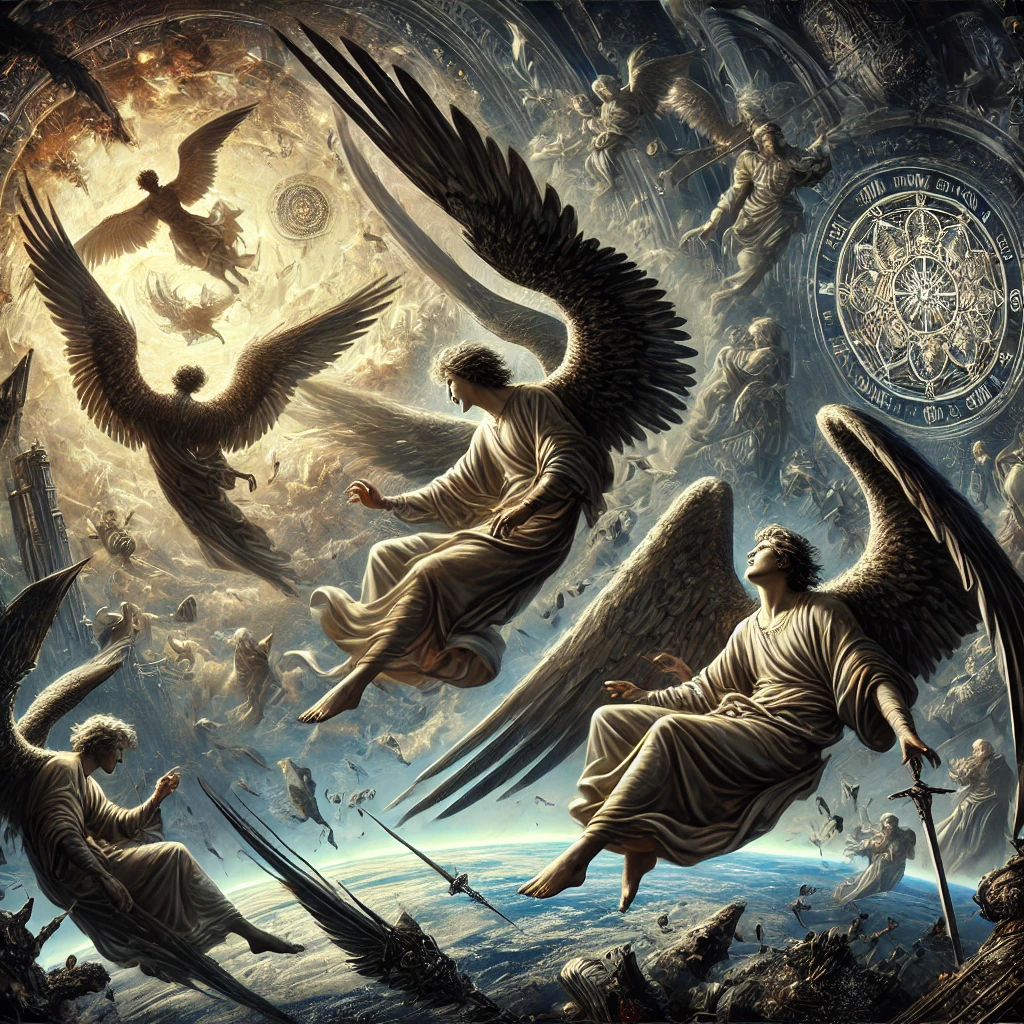Overview
Fallen Angels are celestial beings who, according to various spiritual, religious, and esoteric traditions, chose or were cast out from the divine realm due to rebellion, pride, or disobedience. These beings once held a high rank within the angelic orders but fell from grace due to a severing of alignment with Divine Will. Their story symbolizes the complex dynamics of free will, spiritual evolution, and the duality of light and shadow.
Etymology and Meaning
- The term “fallen angel” comes from the Latin angelus cadens, meaning “fallen messenger.”
- The word “fall” refers both to a descent from heaven and a fall in moral or vibrational state.
- In metaphysical interpretations, a “fall” may symbolize a descent into materiality, ego, or separation from divine unity.
Origins in Sacred Texts
1. The Book of Enoch (Apocryphal Text)
One of the most detailed accounts of fallen angels is found in the Book of Enoch, a non-canonical Jewish mystical text.
- It tells of a group of 200 angels called the Watchers who descended to Earth.
- Led by Shemhazai and Azazel, they took human wives and taught forbidden knowledge to humanity (e.g., weapon-making, sorcery, astrology).
- Their offspring were the Nephilim, described as giants or hybrid beings.
- These angels were judged by God and imprisoned in the abyss.
2. The Book of Genesis (Hebrew Bible)
- Genesis 6:1-4 briefly mentions the “sons of God” (bene ha-elohim) taking human wives, which has been linked to the story in Enoch.
- This passage, while cryptic, is a foundation for the mythos of angelic descent and corruption.
3. Isaiah and Ezekiel (Christian Interpretations)
- Isaiah 14:12–15 refers to the fall of Lucifer, “son of the morning,” traditionally interpreted as a fallen angel.
- Ezekiel 28 describes the fall of a radiant being in Eden, often linked metaphorically to the angelic rebellion.
4. Qur’anic Accounts (Islamic View)
- The Qur’an mentions Iblis, who refused to bow to Adam. Though considered a jinn, he shares the archetype of the rebellious being.
- Angels in Islam are generally believed to be incapable of disobedience, distinguishing Iblis from the angelic order.
Key Figures Among the Fallen
| Name | Role or Legacy |
|---|---|
| Lucifer | The “Light-Bearer,” symbol of pride and rebellion. Often confused with Satan. |
| Azazel | Taught humans forbidden arts; cast into the wilderness. |
| Shemhazai | Leader of the Watchers who made the pact to descend. |
| Belial | Associated with lawlessness and chaos in apocryphal texts. |
Symbolic and Metaphysical Interpretations
1. Fallen Angels as Archetypes
In metaphysical psychology and esotericism, fallen angels represent:
- The shadow aspect of divine beings.
- Misuse of power or knowledge.
- The journey of separation from source and the path to return (redemption).
2. The Fall as Initiation
Some mystery schools view the “fall” not as a punishment but as a necessary phase in the soul’s evolution:
- A descent into matter to gain experience.
- The alchemy of darkness into light through choice and transformation.
- A metaphor for the soul’s journey through ignorance toward wisdom.
3. Duality and Free Will
Fallen angels personify the tension between obedience to divine law and the exercise of autonomous will—the central drama of creation in many spiritual cosmologies.
Influence on Esotericism and Occultism
Fallen angels have influenced:
- Demonology: Many beings referred to as “demons” in Western occultism have origins as fallen angels.
- Ritual Magic: Systems like the Goetia catalog beings often considered fallen spirits.
- Alchemy and Mysticism: Azazel and others appear as figures in texts concerning hidden knowledge, transformation, and karmic reckoning.
- Modern Esoterica: Some spiritual practitioners invoke these beings for shadow work, deep karmic healing, or forbidden wisdom—often with caution and boundaries.
Are All Fallen Angels “Evil”?
Not necessarily. In mystical teachings:
- Some fallen angels seek redemption and assist in humanity’s awakening.
- Others continue to operate in lower realms, influencing egoic or material-driven behaviors.
- As with humans, their status reflects evolutionary potential, not eternal condemnation.
Signs of Fallen Angelic Energy
| Sign | Spiritual Interpretation |
|---|---|
| Attraction to forbidden knowledge | Desire to awaken higher consciousness (or egoic pride) |
| Shadow integration themes | The need to face one’s own inner rebellion or denied gifts |
| Cycles of exile and return | A soul memory of separation and yearning for reunion |
| Encounters in altered states | Possible messages from beings offering forgotten truths or karmic tests |
Related Concepts
Demonology and Angelic Hierarchies
Luciferian Symbolism and Light Consciousness
Spiritual Warfare and Inner Discernment

